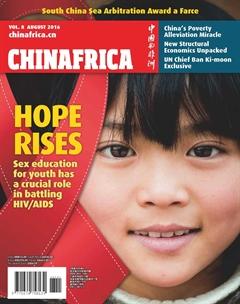With Open Arms
By Godfrey Olukya

After graduating from the University of Dar es Salaam, Evan Kibonge faced an uphill battle for four years trying to land a job. He was at his wits end when he heard the China Henan International Cooperation Group Co. (CHICO), a construction company in central Chinas Henan Province with projects in many African countries, was looking for workers in Tanzania.
It was fates lifeline to him and the 26-yearold was hired as a casual laborer. “When I graduated, I expected to get a white-collar job. But alas, such jobs are nowadays as rare as gold,” Kibonge told ChinAfrica. “[At CHICO] I was immediately employed as a casual laborer with the promise that if I worked well I would be promoted. After only two months, I am now one of the supervisors.”
Kibonge said Chinese investors have done a lot in providing employment in Tanzania.
Pius Ngeze, a cadre of the Chama Cha Mapinduzi ruling party and former legislator, said Chinese investments are vital for Tanzanias economy.
“Since independence on December 9, 1961, China has been helping our country. At first, it used to provide us with aid, but now investors from China have come to provide employment, especially to our youth,” Ngeze told ChinAfrica.
According to Tanzanias National Bureau of Statistics, the unemployment rate in 2014 was 10.3 percent and youth unemployment 13.7 percent. Though both figures were slightly down from the earlier 10.7 and 14.9 percent respectively, it is still a major concern for the government.
President John Magufuli has been inviting more Chinese companies to come and invest in Tanzania.
In June, Magufuli met a visiting delegation of the Communist Party of China (CPC) from Jiangsu Province in east China, and told them his government was committed to providing 40 percent Tanzanians with jobs in the manufacturing sector by 2020. He urged investors from Jiangsu to set up industries in Tanzania and help build up the infrastructure, particularly the conversion of the Central Railway Line to standard gauge.
“I welcome them with open arms,” the president said. “They can come even tomorrow and state their area of investment. We are going to give them our full support. We have enough areas to establish new factories.”
Magufuli said his government is committed to investing in agricultural products such as cotton, coffee and cashew nuts, as well as fish and livestock. He pointed out that while Tanzania will benefit from its people gaining employment, Chinese investors will also benefit, both from the extensive market within Tanzania as well as in the East African Community member countries with a total population of over 158 million people.
Luo Zhijun, who headed the Chinese delegation, said although Chinese investors have already committed $1 billion to Tanzania, there is still room for more investment and he would encourage that on his return to Jiangsu.
The Chinese Ambassador to Tanzania, Lu Youqing, said besides the $1 billion invested in 2014-15, investors from Jiangsu are committed to injecting $5 billion in the next five years, which is expected to see large numbers of Tanzanians recruited, especially the youth, in various capacities.

